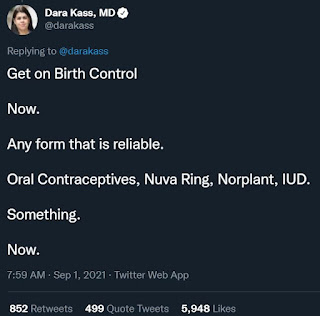5 Benefits of the Texas Heartbeat Bill
There has been no shortage of pushback to SB 8, the Texas bill that bans almost all abortions after an embryonic heartbeat can be detected (about 4 weeks after fertilization, so 6 weeks gestation/LMP). Even many pro-lifers have expressed skepticism as to whether this bill is a good idea, often focused on concerns about the private citizen enforcement mechanism. As far as I can tell, here are the options:
- Early abortion is restricted as a criminal matter with government enforcement.
- Early abortion is restricted as a civil matter with private citizen enforcement.
- Early abortion isn’t restricted.
In the last few years alone, multiple states have attempted heartbeat bills with government enforcement to no avail; many bills are blocked by courts before they can go into effect. The Texas bill went into effect specifically because it replaced government enforcement with private citizen enforcement. So while I agree #1 is preferable to #2, I also recognize that, at least for now, government enforcement isn’t actually an option. In that case, which of the remaining options would you prefer: private citizen enforcement, or no restriction?
I leave that to readers to debate. Meanwhile I want to highlight some of the bill’s benefits.
1. The heartbeat law is dramatically reducing abortion in Texas. Yes, some women will leave the state to get abortions. Some will recognize pregnancy in time to get abortions before fetal heartbeat. Some will order medication abortion pills to induce an abortion illegally. The law will not eliminate abortion in Texas.
But the law will dramatically reduce abortion in Texas and no doubt already has. More minor restrictions (parental notification, limits on taxpayer funding) have significantly reduced abortions. An early gestational limit like this one will have a much broader impact. Even lower estimates suggest 46% of Texas women seeking abortion will carry pregnancies to term. If, like us, you view abortion as killing morally valuable humans, this result is a major step forward in protecting prenatal children.
2. The heartbeat law is likely to reduce unintended pregnancy in Texas. Shortly after SB 8 went into effect, we saw tweets like this one in which medical professionals encourage people to hurry and start using birth control.
 |
| Original tweet here |
This response is not surprising. When elective abortion isn’t available as a back up option, people take more precautions to avoid pregnancy, which explains why abortion restrictions are associated with increased contraceptive use.
3. The heartbeat law is compelling abortion activists to acknowledge embryos and fetuses killed in abortion. Granted, to whatever extent possible, activists are misleading the public about embryonic heart development. But they’re still being forced to acknowledge embryonic heart development–and embryos at all. More typically, activists avoid any mention of anyone involved in abortion other than the woman obtaining one. If they have to, they make vague allusions to “clumps of cells,” not embryos, and certainly not specific developmental milestones.
[Read more – NPR interviews abortion rights activists to determine if embryos have hearts]
Heartbeat laws inevitably bring prenatal children into the conversation, and that’s important because…
4. The heartbeat law is underscoring how much the general public doesn’t know but does care about embryonic development. The pro-choice talking points that there is no embryonic heart or heartbeat at 6 weeks LMP are lies. There would be no need for the pro-choice side to lie if no one cared about embryonic hearts and heartbeats. But people do. The general public has believed that very early abortion removes a literal sphere of amorphous cells, not an embryo with a functioning cardiovascular system (and arm and leg buds, the beginnings of facial features, etc). That level of development gives people pause, which may be why polls both nationally and specific to Texas have found more support than opposition for banning abortion after 6 weeks gestation.
| Embryo 6.5 weeks postfertilization/8.5 weeks LMP by Lennart Nilsson |
5. The heartbeat law is inspiring other pro-life states to get more aggressive about restricting abortion. Pro-life politicians and activists are discussing similar legislation in Florida, Arkansas, and South Dakota, and abortion supporters are worried/expecting perhaps a dozen other states to follow suit.



Leave a Reply
Want to join the discussion?Feel free to contribute!